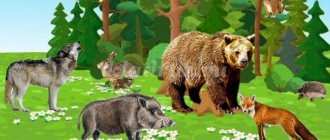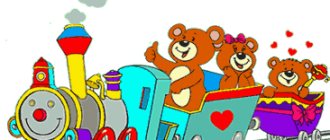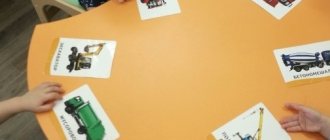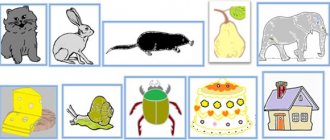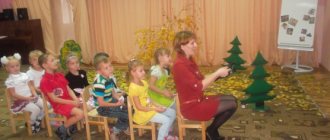Summary of educational activities for the development of speech on the topic “Transport” in the senior group.
The teacher asks 2 children to describe transport
, and say on what
transport
Dunno will deliver his cargo.
Educator: Now children, try to name the object affectionately:
-Airplane (airplane)
; car, ship...
Great, you made me happy again. And now, we will have a little rest and new, interesting games await us.
Finger gymnastics “Chauffeur”
Have your hands ready, look carefully and repeat the movements and words after me.
The driver worked all day (rib-palm)
He is tired and dusty (imitation of shaking off dust)
He carried bricks and clay (bend fingers one at a time)
Rocks, logs and sand.
He transported everything to the construction site (circular movement with fingertips)
And went to the wash (movement of “washing palms”
)
Educator: Listen to the next task. "How does transport "
. I'll start a sentence, you have to finish it:
-The steamer is sailing, and the car... is driving, The tram is moving, and the plane... is flying,
The plane flies, and the bus... travels, the ship sails, and the train... travels.
Well done, you also coped with this task.
The next task is for attentiveness. Game “Flies or doesn’t fly”
Guys, I will show pictures if air transport
- you must show your wings (arms to the sides, and if not, then stomp your feet.
Helicopter - children put their arms out to the sides.
Tram - stomping feet.
Plane, bus.
Educator: Well done!
Children, what we studied today. What types of transport
, You know.
What type of transport
can Dunno use to deliver goods to the post office?
You worked well in class
so I will give you these pictures of
transport for coloring
. Teacher handing out car coloring pages
Developmental task:
Teach children to generalize and classify vehicles: cargo, passenger, fine motor skills, coordination of speech with movement, visual attention and perception.
Educational speech tasks:
write a descriptive story about this toy vehicle using questions:
- practice the practical use of words with affectionate and magnifying connotations;
- practical use of prefixed verbs;
- agree nouns with adjectives in number, gender, case;
- learn to compose a whole from parts (cut pictures).
Corrective task:
train children in the use of feminine and masculine nouns; expand your vocabulary on the topic “transport”.
Educational task:
teach children the rules of behavior in public transport through playful images.
Materials:
toys transport, pictures of transport, cut-out pictures of transport, audio recording “Bus”, panorama of the city with images of transport.
Topic: Transport
Goal: to generalize and systematize the idea of transport, to activate the vocabulary on this topic, the practical use of prefixed verbs and compiling a short descriptive story using questions.
Program content:
Developmental task: Teach children to generalize, classify vehicles: cargo, passenger, fine motor skills, coordination of speech with movement, visual attention and perception.
Educational speech tasks: compose a descriptive story about this transport toy using questions:
- practice the practical use of words with affectionate and magnifying connotations;
- practical use of prefixed verbs;
- agree nouns with adjectives in number, gender, case;
- learn to compose a whole from parts (cut pictures).
Corrective task: to train children in the use of feminine and masculine nouns; expand your vocabulary on the topic “transport”.
Educational task: to teach children through game images the rules of behavior in public transport.
Materials: toys transport, pictures of transport, cut-out pictures of transport, audio recording “Bus”, panorama of the city with images of transport.
Progress of the lesson
— Guys, how did you get to kindergarten today, who lives far away, what? (On foot, car, bus)
- Those who live next to the kindergarten came on foot, those who live far from the kindergarten - went by bus, car, taxi (the teacher places the corresponding pictures on the magnetic board). What is a car, a bus, a taxi? (Transport)
— What are the people who travel in passenger transport called? (Passengers)
— What is the name of the machine that helps transport cargo? (Cargo)
— What kind of cargo can trucks transport (Furniture, sand, snow, food, gasoline, milk, etc.)
Pay attention to the panorama of the city, consider the image of transport. Finger game “Let’s count.”
We will bend our fingers - (clench and unclench our fingers) We will name transport: Car, taxi, Tram, metro, bus (unclench our fingers, starting with the little finger) We clenched 5 fingers into a fist, named 5 types of transport. (clench your fingers into a fist, starting with the thumb).
— Who drives passenger and cargo transport (driver, driver).
Generalization from the teacher: Cars are our helpers, but without a driver they cannot work. The driver must know well the structure of his car and its parts.
- Do you know what main parts it consists of?
— What is the name of that part of the car where the driver sits and controls the car? (Cabin)
—Where do they put the cargo? (Body)
— Where do the passengers sit? (Salon)
— Without which part will the car never move? (Without wheel)
Game exercise “Riding on the bus”
“Now let’s all take a ride on the bus together.” Who will we be on the bus? (Passengers). How should passengers behave on the bus and why?
I will speak, and you answer:
— The bus from the stop ( departed ), to another stop ( arrived ). Then he climbed a small hill ( drove in or drove over ) and together with us he bridged ( moved over ). He quickly entered the tunnel ( drove ) and from there soon to a gas station ( went, arrived ).
Speech game “At a gas station”
All the cars in order arrive at the gas station. (with both hands “turn the steering wheel” in front of you) A fuel truck, a garbage truck, a milk truck with milk, a grain truck with fresh bread, and a heavy timber truck.
(Fingers alternately, starting with the little finger, touch the palm).
Having refueled, the bus went to the exhibition-salon ( arrived, stopped ).
— An exhibition-salon of vehicles “Funny Motors” opened in our group. I will be the director, and you will be the car sales managers. You must tell us about the transport you like and advertise it:
Car name.
What is she like: describe her appearance, color.
Name the parts.
What is it intended for?
— I’ll start with advertising: This is a bus. He is red. It has a cabin, wheels, many windows, doors. The bus carries passengers.
Listen to 3-4 stories.
- Guys, in the distant fairy-tale country of “Liliput” there live little people and everything they have is small: clothes, shoes, and transport.
Game exercise “Big-small”
| Educator | Children |
| car | machine |
| automobile | car |
| truck | truck |
| tram | tram |
| trolleybus | trolleybus |
| bus | bus |
Cars are our faithful and reliable assistants. But in order for them to serve for a long time, they need to be looked after, repaired, and placed in the garage.
Didactic game “Fix the car”
The drivers pressed hard on the pedals, the car fell apart into parts. Help, help, assemble a car from parts.
Children assemble cars piece by piece (from cut-out pictures). At the end they say what they did.
And now I’m turning you into a machine, whoever wants what kind. And each of you will leave the lesson with your own signal. Verbal game “Pretend to honk your car’s horn” (honk your horn loudly for goodbye, honk quietly for the cars to drive far away).
